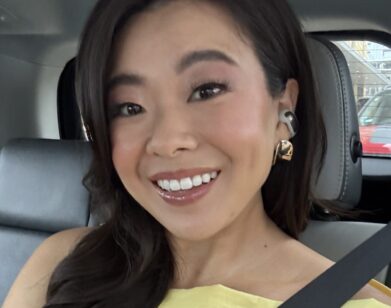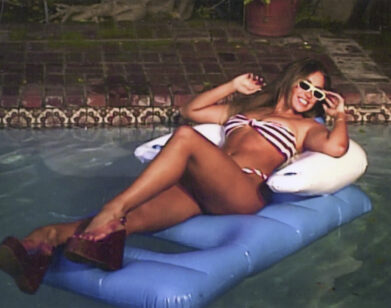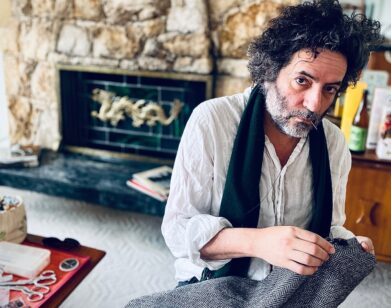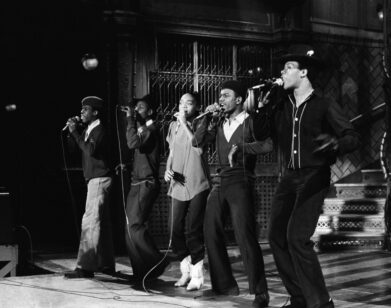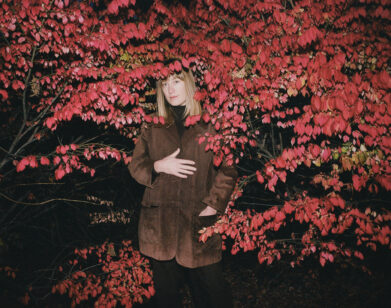Whats Poppin
Jack Harlow Talks to Pete Davidson About Phone Sex, Tour Riders, and the Perks of Stardom
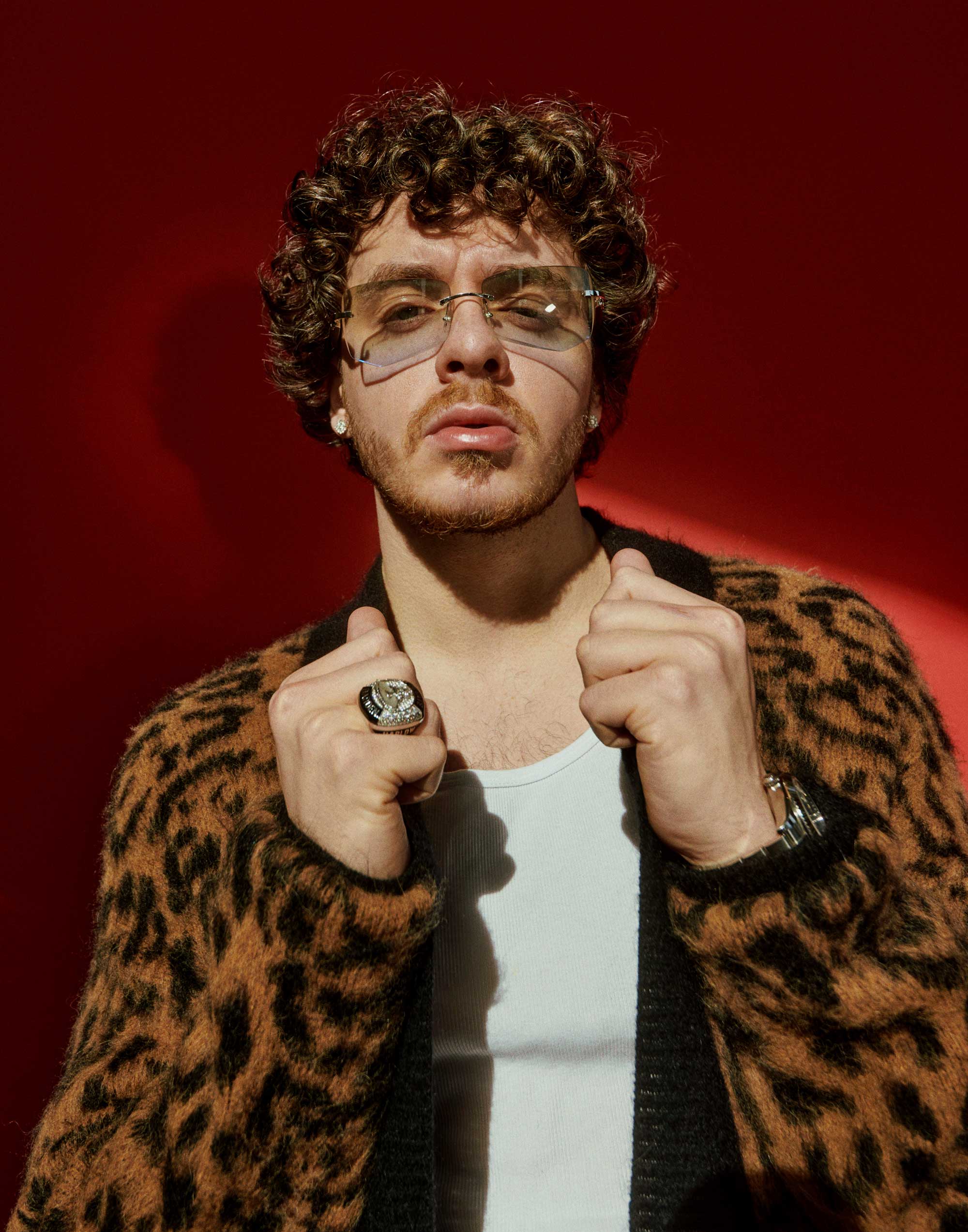
Cardigan by LANEUS. Tank Top by CALVIN KLEIN UNDERWEAR. Sunglasses by CARTIER. Ring JACK’S OWN.
When Jack Harlow played Saturday Night Live last month, he checked one of the most important boxes on the application to become a major music star. The Kentucky-born rapper made it all the way to Studio 8H on the bonafides of his debut album, last year’s critically-acclaimed Thats What They All Say, and its breakout hit, “WHATS POPPIN,” a single which taps all the hallmarks of modern rap stardom: It made it to number two on the charts, contended for song of the summer, went viral on TikTok, and featured a Cole Bennett-directed music video and a DaBaby-assisted remix. Meanwhile, the song itself is a perfect encapsulation of what makes Harlow so likeable, blending musical and lyrical chops with a breezy vibe that camouflages serious artistry. And while Harlow’s success does have an overnight vibe to it, the 22-year-old has been rapping since the seventh grade and was selling out local shows in high school. By 2018, Harlow found himself in Atlanta, where his career began to accelerate at a rapid clip, signing a record deal with Atlantic and landing on XXL’s Freshman Class cover. Earlier this year, he was nominated for his first Grammy, the capper to a strange year that saw Harlow cultivate a bigger fanbase that he has yet to perform for live. That brings us back to Saturday Night Live, and in particular, Harlow’s budding friendship with one of the show’s resident rap parodists, Pete Davidson. By now, you’ve probably seen the music video of the two of them helpfully explaining NFTs, but in case you’re looking for more Jack and Pete energy, please enjoy the following conversation.
———
PETE DAVIDSON: Mr. Harlow, playing SNL is a milestone for lots of musicians. Now that you’ve achieved this one, are there any other legendary stages you have in your sights?
JACK HARLOW: Coachella and the Super Bowl. Those are the first ones that come to mind.
DAVIDSON: Sick. Who is your favorite SNL castmember ever?
HARLOW: Well, you’re the closest I’ve ever gotten to one.
DAVIDSON: Thank you, Jack. But, seriously. Kenan?
HARLOW: I’m a big Bill Hader fan. I grew up on a lot of Kristen Wiig.
DAVIDSON: Bill Hader is responsible for me getting on SNL.
HARLOW: Really?
DAVIDSON: Yeah. I owe my career to that guy. Can you tell people what the process is like to choose which songs you’re going to perform on SNL?
HARLOW: Well, they want the big hits, so “WHATS POPPIN” felt like, “All right, let’s knock this one out.” It’s a cool song. I wanted to medley it with “Tyler Herro” because I performed “WHATS POPPIN” on TV a few times now, so I wanted to balance that with something I haven’t done a lot with. And then I wanted to do something that was kind of flying under the radar, something musical. And I wanted to bring out somebody that women over 40 love.
DAVIDSON: Hell yeah. My mom was definitely soaked for Adam Levine.
HARLOW: Yo, women are wet for him, bruh. It’s crazy.
DAVIDSON: It’s ridiculous. Why do you rap under your real name and can you tell us some monikers that didn’t make the cut?
HARLOW: When I was young, I used to go by Mr. Harlow. Then I grew out of that. I was a popular kid around my city from middle school onwards. So Jack Harlow is kind of how people knew me. Even when I had the rap name, Mr. Harlow, it was like it was somebody else. Authenticity has been so important to me that I think going under my name has subconsciously forced me to truly be myself, as opposed to assuming some character. I’m not some caricature of myself. I’m really being me. But another alias that the fans have given me, and I don’t know why, is Missionary Jack.
DAVIDSON: Because you’re a sweet guy, man. You look like you do missionary.
HARLOW: I don’t know why they keep saying it.
DAVIDSON: You like face-to-face contact. You’re a lover boy.
HARLOW: You know me a little too well, brother.
DAVIDSON: Was there a specific artist or person who gave you a co-sign at exactly the right time that gave you the confidence to go on?
HARLOW: That’s a good question.
DAVIDSON: Yeah.
HARLOW: People always say, “Good question” when they don’t have an answer yet. I don’t fucking know.
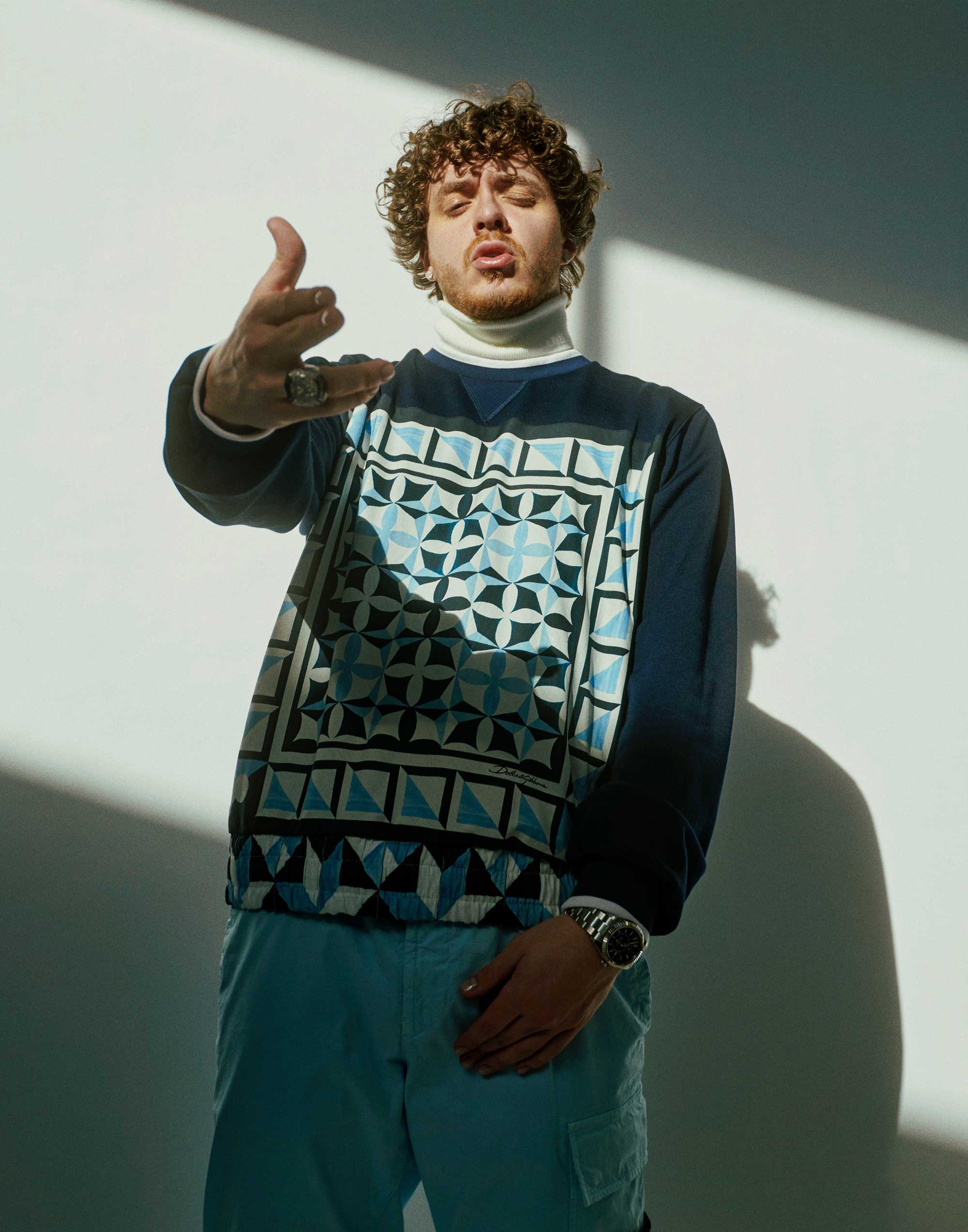
Sweater by DOLCE AND GABBANA. Turtleneck by Z ZEGNA. Pants by STONE ISLAND. Ring and Watch JACK’S OWN.
DAVIDSON: I guess another way to say it is, was there a moment that you got hit up by a certain artist where you’re like, “Okay, I’m in this shit.”
HARLOW: Yeah. When Lil Wayne did the “WHATS POPPIN” verse and then when we got to talk and he interviewed me on his show. Incredibly validating.
DAVIDSON: That’s awesome. Do you think it’s important to have a chip on your shoulder in order to stay hungry and motivated?
HARLOW: I think you either have a chip on your shoulder or you don’t. It’s not a matter of if it’s important or not, but I think it’s valuable, because then you want to go and get it. I don’t know if I have a chip on my shoulder or not. I just want all the spoils I can get out of life. I just want to live the fullest life I can live. But I think sometimes I feel like I have something to prove and that fuels me.
DAVIDSON: What has the last year been like? Is there any part of you that you felt like you’re wasting a year in the prime of your career? Has that been frustrating at all, or have you taken advantage of the world slowing down?
HARLOW: When it first happened, I was worried, but I got so blessed during this pandemic that I can’t even say yes to that, because my life changed. I’m really going to look back on the pandemic as when everything changed for me. I think my music on the album I just dropped took a turn for the introspective because I slowed down and I was sitting in my bedroom as opposed to partying and looking at women. I started to look inward. That’s something that I’ve been keeping in mind. So there’s been some benefits. I’m not saying I’m glad we had a pandemic, but there’s a silver lining.
DAVIDSON: Very smooth. Was there a point in your career where you felt like an outsider or an outcast? If so, at what point do you stop feeling like you were one?
HARLOW: I feel like one when I perform in Atlanta nightclubs. or when I go to the strip club with a group of people. I’ve grown more accustomed to certain things, but there’s certain things that I’ll forever be an outsider of, no matter how much I’m accepted or I’m comfortable because it’s not necessarily my world and it’s not meant to be my world. So I feel like an outsider all the time. I’m a white man in a Black genre.
DAVIDSON: Good answer. Everyone deals with imposter syndrome at one point. Can you talk about if you felt that and if you still feel like that? I think that’s the same question, right?
HARLOW: Yeah. I feel it like once a week, but it gives me coverage. I saw David Bowie talking about how much of a fraud he felt like. He was so cool, that it makes me feel like it’s okay to feel like a fraud sometimes. I think it’s also the effect of feeling the opposite end of the spectrum. Feeling like the man all the time, which I have moments where I feel like the man and I think the effect of that is there’s a lot of moments where I have to feel like the opposite.
DAVIDSON: You definitely have a healthy balance though. We come across people who think they’re the man all the time and it’s kind of embarrassing.
HARLOW: I had a film studies teacher and I loved how he put it. His name was Mr. Cooksey at Atherton High School, and on the first day of class, he drew on the board a superhero and then way below the superhero, he drew an ugly troll. Then right between them, he drew a regular stick figure, and there was an arrow pointing to the ugly troll and the superhero. He said, “Yo, we spend a lot of time thinking we’re Superman. We spent a lot of time thinking we’re the ugly, disgusting troll that nobody likes. But really, you’re that stick figure in the middle. You’re nobody. You’re just a regular guy.”
DAVIDSON: That’s tight.
HARLOW: It was.
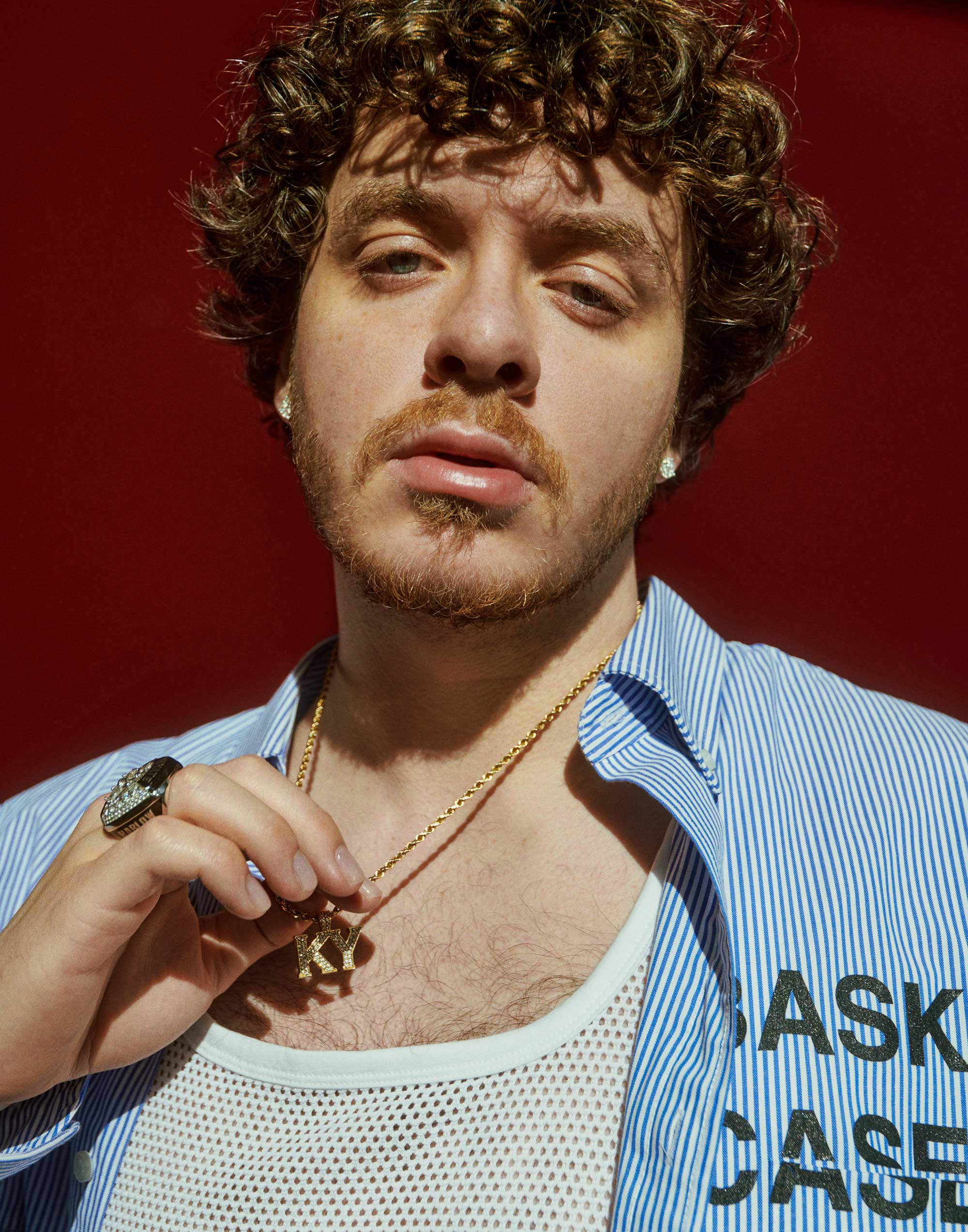
Shirt by BASKETCASE GALLERY. Necklace and Watch JACK’S OWN.
DAVIDSON: Do you see yourself as a part of a lineage of other white rappers or do you think you’ve transcended that label?
HARLOW: I don’t see myself ever transcending that label, but I feel like people can feel that I don’t lean on my whiteness as too much as a crutch. It’s not something I’ll ever escape. This is who I am. I’m a white person. But I’d like to think people are listening to my music as a rap artist. But when they see me, they’re like, “Oh, he’s still white.” So it is what it is.
DAVIDSON: Do you think people expect white rappers to be funny? If so, how do you deal with those expectations?
HARLOW: No, I don’t think people expect white rappers to be funny. I think white rappers probably have a little more room to be funny, but I don’t think they’re expected to be. If anything, I feel like I came into the game and me being funny probably disarmed some folks because I think everyone’s expecting white rappers to take themselves too seriously.
DAVIDSON: Right.
HARLOW: Sometimes I find myself doing that, but I have such a wide personality as all of us do. As I get older, I just learned to honor the totality of who I am as opposed to saying, “I’m this.” I’m ever shifting, like all of us.
DAVIDSON: What was it like moving to Atlanta to pursue music and what was it like moving to a new school? Did you have to make a whole new group of friends and get accepted there?
HARLOW: Atlanta grew me up a lot. It took me out of my comfort zone. It changed how I recorded music. It boosted my work ethic. I owe a lot to moving to Atlanta because I got an idea of what it takes. I was around so many artists. I was pushed into rooms that I wasn’t always ready to be in. I think I just got a lot of context on what’s going on on a cultural level that maybe L.A. or New York probably couldn’t have given me. I think they could have given me other gifts, but Atlanta gave me something really unique. At the same time, it wasn’t too far removed from what Kentucky felt like, on a Southern level.
DAVIDSON: Do you read the comments?
HARLOW: Listen, I used to read everything. Now I slowed down a lot because people shouldn’t be able to type something and get you to see it. People shouldn’t have that right.
DAVIDSON: Complete strangers can fuck up your whole vibe.
HARLOW: Yeah, they shouldn’t just have access to you. Anyone could type something. So people just shouldn’t have that access. That’s how I see it. It should be harder to get to me.
DAVIDSON: What’s on the Jack Harlow tour rider?
HARLOW: Oh my god. That shit needs an update. It’s going to get updated because all it was was Nature Valley bars and fruit because I was being fake healthy for so long. When we get back in action, I’m going to have lint rollers, a couple of phone chargers, wrinkle releasers, lubricant, melatonin. Oh, I’m about to splurge.
DAVIDSON: Your schedule is very hectic and you got a lot going on. What does Jack Harlow do to chill?
HARLOW: I clean the house.
DAVIDSON: Really?
HARLOW: I love to clean. It does something for me. It releases a lot of endorphins. I like phone sex.
DAVIDSON: That’s what’s up. I’m going to let you sit with that for a sec. So you like having phone sex. I’m very bad at phone sex because I think because of how I sound. I’m like, “Do you like that?”
HARLOW: I say it the same way. I say the same sentence, just not in that tone. That’s the go-to.
DAVIDSON: What are some things you need to have in the studio when you’re recording?
HARLOW: Sparkling water.
DAVIDSON: Yeah. You’re a sparkling guy, I noticed. You got a sparkling personality.
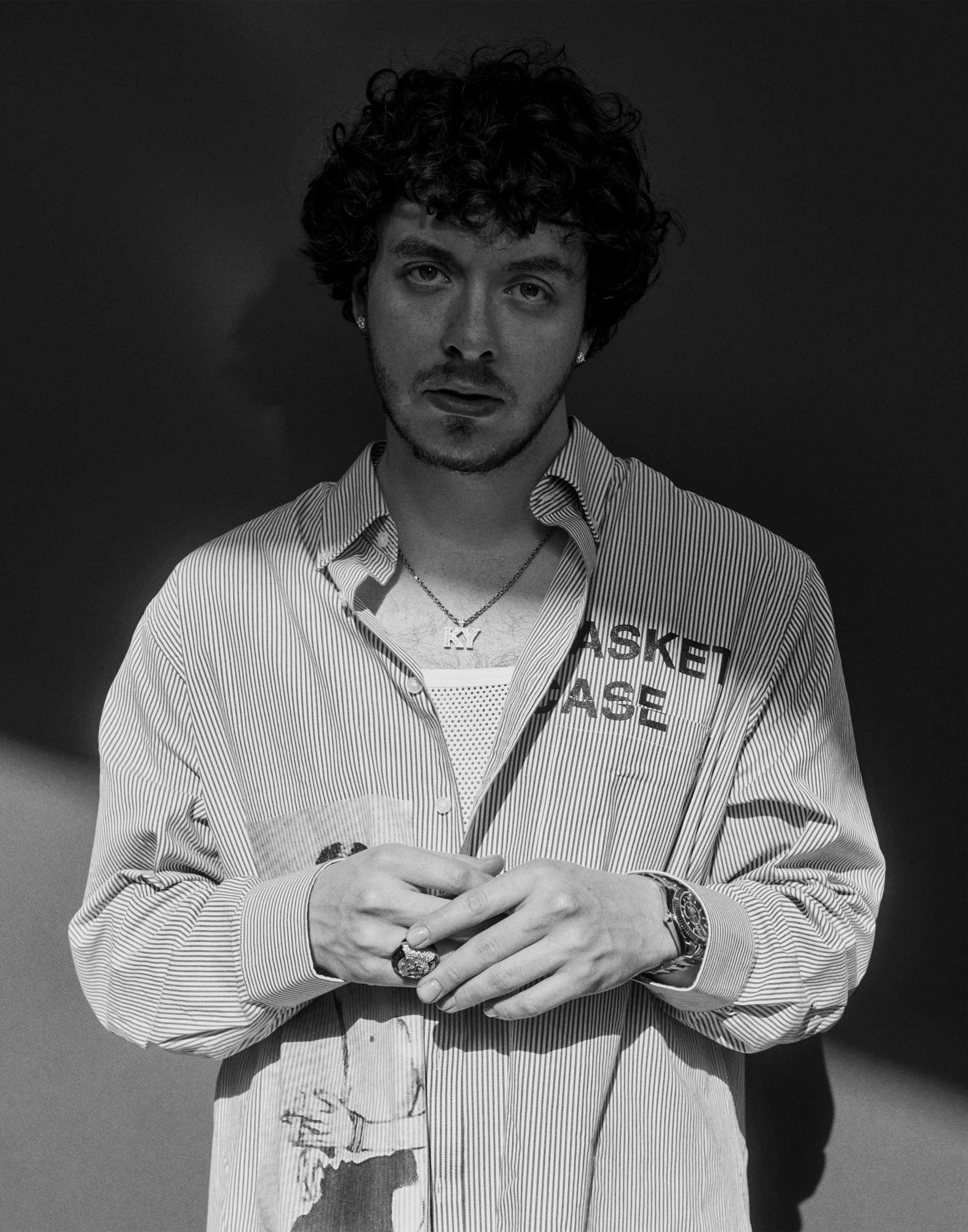
Shirt by BASKETCASE GALLERY. Necklace and Watch JACK’S OWN.
HARLOW: Thank you. I used to want to be alone, but I’m starting to realize I perform better with an audience. So I won’t say I need an audience, but I’m starting to prefer one. The pressure of, “Damn, I’ve got to kill this verse because there’s some cute girls in here,” is really compelling.
DAVIDSON: I hear that. What’s what’s the first thing you do when you get to a new city?
HARLOW: I like to settle in. For some reason I have a lot of anxiety about transitioning, going from place to place. I don’t have a seizure or anything, but I really don’t enjoy the in-betweens. I like to be settled. One of the things I really loved about the last tour I went on before everything shut down was we would get to the city early in the afternoon, two, so we’d have five or six hours to see a city we’d never seen. We’d get on the motorized scooters and I’ll go with some of my best friends and go see a new city. That’s the gift.
DAVIDSON: That’s awesome.
HARLOW: I love going to see city markets. I love seeing little hidden gems in the country.
DAVIDSON: It’s also fun when you can bring your boys with you.
HARLOW: Oh my God, bro. That’s the real gift of it all.
DAVIDSON: How much do you pay attention to the numbers? The streams, the followers, the sales. Do you obsess over them, or do you just put something out and let it be what it is?
HARLOW: Something in between those two. I care. I wouldn’t say I obsess, but I like to see them numbers going up, man. Just as much as I like to see a cheque.
DAVIDSON: Right. Now, do you try and make music for a particular moment or do you try and make music that lasts, and is there tension between the two. What do you think makes something a classic?
HARLOW: There is tension. That’s an inner conflict I’m faced with all the time, because it is fun to dabble with what’s modern and make things that are a reaction to the current moment. But my ultimate goal is to be an artist that is giving you classics, giving you stuff that sounds good in 30, 40 years. I was listening to “Fly Like An Eagle” by Steve Miller Band. I was like, “This is as good as it gets right here.” So for me, that’s what I’m shooting for.
DAVIDSON: Well, you’re well on your way to flying like an eagle, Mr. Jack Harlow. Thank you very much for having me interview you. That is all of the questions.
HARLOW: You’re a good talker, my friend.

Sweater by DOLCE AND GABBANA. Turtleneck by Z ZEGNA.
Photo Assistant: Joey Abreu. Groomer: Brent Lavett.

